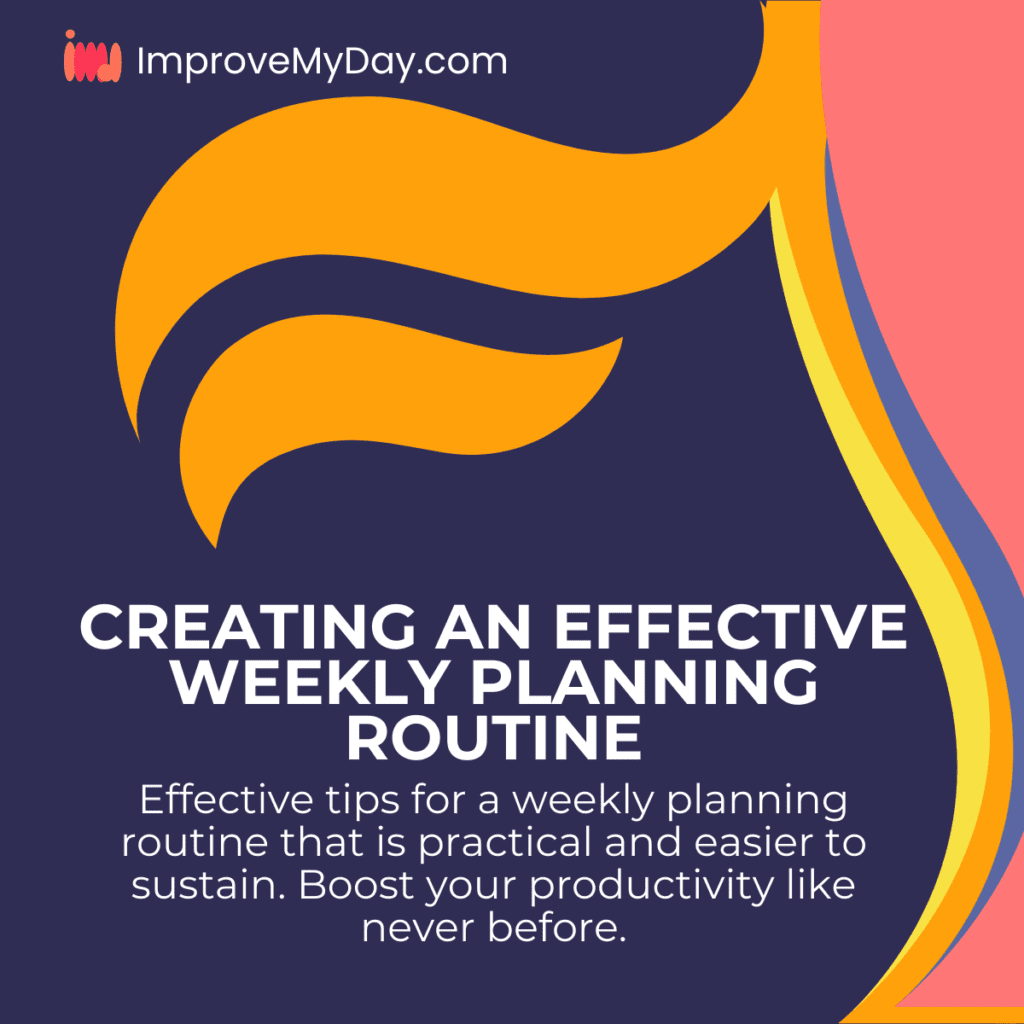Staying organized and productive can feel like an uphill battle. But what if I told you that dedicating just a few hours each week to planning could transform your life? That’s where a weekly planning routine comes in. By establishing a consistent approach to organizing your time and tasks, you’ll set yourself up for success and achieve more than you ever thought possible.
Why You Need a Weekly Planning Routine
Before we dive into the nitty-gritty of creating your routine, let’s talk about why it’s so crucial. A well-structured weekly planning routine offers numerous benefits:
- Increased productivity: By mapping out your week in advance, you’ll waste less time deciding what to do next.
- Reduced stress: Knowing what’s coming up allows you to prepare mentally and emotionally for challenges.
- Improved work-life balance: Proper planning ensures you make time for both professional and personal priorities.
- Better goal achievement: Regular planning keeps your long-term objectives in focus, helping you make consistent progress.
- Enhanced time management: You’ll learn to allocate your time more effectively and avoid overcommitting.
Key Components of an Effective Weekly Planning Routine
To create a weekly planning routine that works, you need to include these essential elements:
1. Review and Reflect
Start your planning session by looking back at the previous week. What went well? What didn’t? This reflection helps you learn from your experiences and make improvements.
2. Set Goals and Priorities
Identify your most important objectives for the coming week. These should align with your long-term goals and current priorities.
3. Time Blocking
Assign specific time slots to your tasks and activities. This technique helps you focus on one thing at a time and makes your schedule more realistic.
4. Task Allocation
Break down your goals into actionable tasks and distribute them throughout the week. Be sure to consider deadlines and dependencies.
5. Buffer Time and Flexibility
Leave some unscheduled time in your plan. This buffer allows you to handle unexpected tasks or emergencies without derailing your entire week.
Creating Your Weekly Planning Routine: A Step-by-Step Guide
Now that you understand the key components, let’s walk through the process of establishing your own weekly planning routine:
- Choose a consistent day and time: Pick a slot when you’re typically free from distractions. Many people prefer Sunday evenings or Monday mornings.
- Gather your tools: Whether you prefer digital apps or pen and paper, have everything ready before you start.
- Review the past week: Spend 15-20 minutes reflecting on your achievements and challenges from the previous week.
- Check your long-term goals: Remind yourself of your bigger objectives to ensure your weekly plans align with them.
- List your weekly goals: Write down 3-5 key things you want to accomplish this week.
- Break goals into tasks: For each goal, identify the specific actions needed to achieve it.
- Schedule your tasks: Use time blocking to assign each task to a specific day and time slot.
- Plan for self-care and personal time: Don’t forget to schedule exercise, relaxation, and social activities.
- Review and adjust: Look over your plan to ensure it’s realistic and balanced.
- Commit to your plan: Once you’re satisfied, make a mental commitment to follow through.
Tools and Resources for Effective Weekly Planning
While you can create a weekly planning routine with just pen and paper, many digital tools can streamline the process:
- Calendar apps: Google Calendar, Apple Calendar, or Microsoft Outlook
- Task management tools: Todoist, Asana, or Trello
- All-in-one planners: Notion, Evernote, or OneNote
- Specialized planning apps: Any.do, Fantastical, or Planner Pro
Choose a tool that fits your needs and preferences. The best planner is the one you’ll actually use consistently.
Overcoming Common Weekly Planning Challenges
Even with the best intentions, you might face some hurdles in maintaining your weekly planning routine. Here’s how to tackle common issues:
- Lack of time: Start small. Even 30 minutes of planning can make a big difference.
- Overplanning: Be realistic about what you can accomplish. It’s better to under-plan and overachieve.
- Unexpected events: Use buffer time in your schedule to accommodate surprises.
- Procrastination: Make planning enjoyable by coupling it with a reward, like your favorite coffee or music.
- Inconsistency: Set a recurring reminder and treat your planning session as a non-negotiable appointment.
Tips for Sticking to Your Weekly Planning Routine
To make your weekly planning routine a lasting habit:
- Start small: Begin with a simple routine and gradually add complexity as you get comfortable.
- Be consistent: Stick to your chosen day and time for planning each week.
- Make it enjoyable: Create a pleasant environment for your planning sessions.
- Track your progress: Celebrate your wins and learn from your setbacks.
- Adjust as needed: Your routine should evolve with your changing needs and lifestyle.
Conclusion: Your Weekly Planning Routine Awaits
Creating an effective weekly planning routine is a powerful step towards taking control of your time and achieving your goals. By dedicating a few hours each week to thoughtful planning, you’ll set yourself up for success, reduce stress, and make consistent progress towards what matters most to you.
Remember, the perfect routine is the one that works for you. Don’t be afraid to experiment and adjust until you find your sweet spot. With patience and persistence, your weekly planning routine will become a cornerstone of your personal and professional success.
So, why wait? Start crafting your weekly planning routine today and watch as your productivity and satisfaction soar. Your future self will thank you for the time and effort you invest now in creating a more organized, balanced, and fulfilling life.



